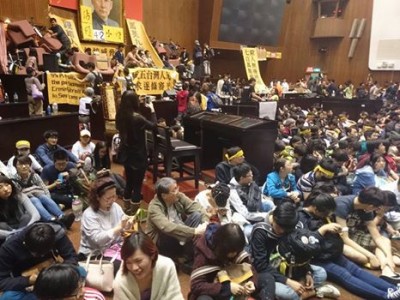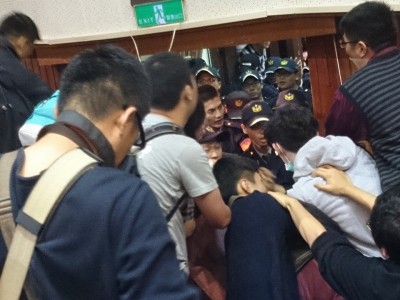A group of protesters stormed Taiwan's legislature March 18, 2014 demanding a full public review of a controversial trade agreement with China after ruling party lawmakers pushed the bill through committee.
The latest Cross-Strait Service Agreement, a bilateral trade agreement between Taiwan and China, was sent to the Taiwan's legislature for reviewing after 16 rounds of public hearings, which ended on March 10, 2014. Even though China is a huge market for Taiwanese businesses, some fear the unrestricted entry of mainland capital poses a threat to Taiwanese culture, freedom of expression and even national security.
While most lawmakers within the Legislative Yuan, as the island's legislature is called, agreed to review the agreement clause by clause, Chang Ching-Chung, the presiding chair of the legislature’s internal Administrative Committee, declared on March 17 that the committee had already completed review of the agreement. Backed by the ruling party, Chang sent the agreement to the legislature's plenary session for its second reading without proper review processes.
Since the Taiwanese and Chinese government started signing bilateral economic cooperation agreements in 2010, a number of Taiwanese civic groups have been protesting against the “black-box” negotiation process not open to the public. Serious concerns have been raised by people from all walks of life. Amid mounting pressure, the Legislative Yuan finally agreed to hold public hearings and a clause-by-clause review of the agreement, but the ruling party has failed to keep that promise.
In reaction to the ruling party's autocratic decision, angry protesters from different civic groups surrounded the Legislation Yuan, and some even occupied the podium in the legislation building. They called for a proper review of the Service Trade Agreement and an apology from the ruling party for its shady move, which violates the earlier agreement of a thorough review.
Since March 17, protesters against the Service Trade Agreement have surrounded the Legislation Yuan. They raised banners with slogans such as, “9% President Ma forced the parliament to pass Cross-Strait Agreement on Trade in Services (Agreement) within 3 seconds.” According to a poll in September 2013, only 9.2% of the general public was satisfied with President Ma Ying Jeou's performance.
The civic group Democratic Front Against Cross-Strait Trade in Services Agreement explained their protest [zh] on their Facebook page:
我們再次強調,目前全國已有百分之七十三民眾表達應該逐條審查,其中包含百分六十八的國民黨支持者,但是馬英九總統違背民主國家三權分立的基礎,踐踏立法程序三十秒就讓服貿協議過關…
We must emphasize that currently 73 percent of citizens believe this Service Trade Agreement should be reviewed clause by clause. 68 percent of ruling party supporters also hold the same opinion. Nevertheless, President Ma [Ying-jeou] trod on our Constitution concerning the division of legislative, executive and judicial powers and made the Legislation Yuan pass the Service Trade Agreement within 30 seconds.
J. Michael Cole, a Taipei-based journalist, tried to explain why the Ma administration took such a bold move:
A number of factors can help explain this, including a disorganized opposition; the ascension of Xi Jinping in China; President Ma Ying-jeou’s re-election in 2012; and the fact that, under Taiwanese law, this will be his last four-year term as president.
All those factors, added to growing Chinese impatience at the pace of “progress” in the Taiwan Strait — by this read the commencement of negotiations on Taiwan’s political future — and fears that whoever comes after Ma might not be able, or willing, to deliver the political goods, have resulted in Beijing applying tremendous pressure on Taipei, and thus forcing it into a reactive position. Already, some prominent individuals have observed that Ma’s government has failed to take the initiative in cross-strait negotiations by allowing China to set the agenda, a most dangerous strategy (or non-strategy).










16 comments
Could you tell me where is the number “73%” from? Thanks
Hi Jamie, thanks for your question so I can clarify what the protesters meant in their statement. Based on my research, they referred to a census completed by the Democratic Progressive Party (http://www.coolloud.org.tw/nod…, 70.5% of the subjects chose to restart the negotiation of the Service Trade Agreement with China, and 73.8% of the subjects who classified themselves as ‘neutral voters’ (meaning they are not a supporter of any certain political party) chose to restart the negotiation. At another extreme, the Executive Yuan’s census showed that 60% of the subjects chose to pass this agreement as soon as possible (also mentioned in the previous link). In the middle of the two extremes, the Mainland Affairs Council’s census shows that 45.7% of the subjects chose to support this agreement (http://www.cna.com.tw/news/aip…. The previous links listed above are supposed to be reliable media sources in Taiwan (so I am sorry that they are written in traditional Chinese).
•
Edit
•
Reply
•
Share ›
Occupy Congress 2014 Taiwan
Live Text Broadcast Website (English Version)
http://www.occupycongress2014taiwan.com/
Kindly Scroll Down to:
===↓ Live Broadcast Below ===
And Refresh Page from time to time
Sorry can’t see the links that provide the statistics~
Hi JF, I do not know what happened to the links I posted in the previous message. I will post them again: first one http://www.coolloud.org.tw/node/77794 second one http://www.cna.com.tw/news/aipl/201312270163-1.aspx